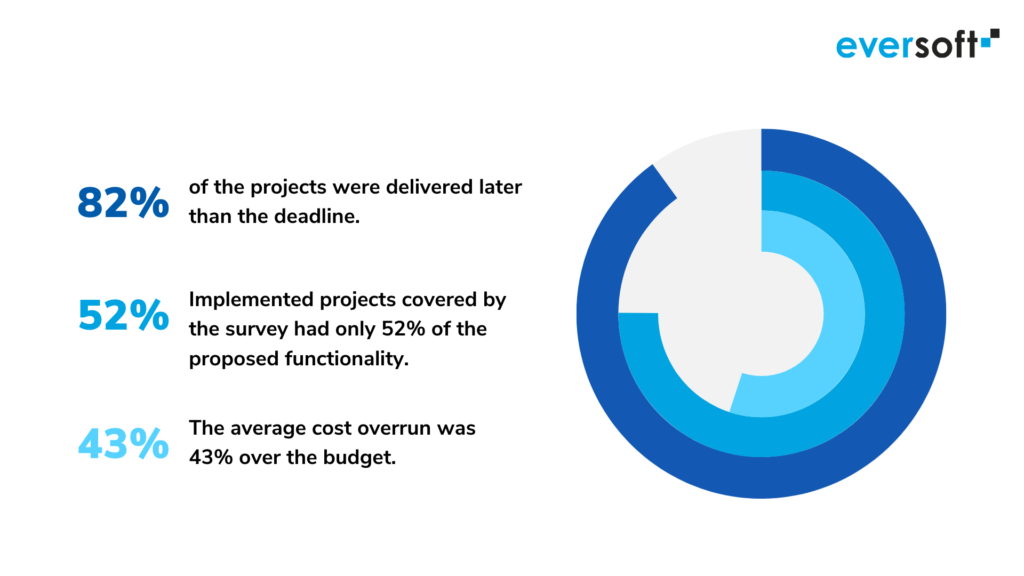How scrum may help you manage your IT project?
Contemporary market forces all entrepreneurs to be very flexible in running their own businesses. Often an emerging market opportunity should be taken advantage of immediately in order for the supplier to be the first to offer customers an innovative service or a way to deliver it.
On the other hand, most services or production processes require complex IT systems. Their change involves the preparation of an exact specification and design, execution and testing. Short time from new business ideas to launching IT systems implementing these ideas in the real business world forces changes in the approach to IT systems modification or production. Incompetent management of a flexibly changing IT project can often bring poor results, both in terms of timely implementation, budgets used and investors’ satisfaction.
According to the often quoted Standish Group report:
- 82% of the projects were delivered later than the deadline;
- implemented projects covered by the survey had only 52% of the proposed functionality;
- the average cost overrun was 43% over the budget.

The reason for these poor statistics lies not only in the methodology of software production within the ongoing projects, but also in the business model linking the customer with the supplier.
While the issue of software production is mainly the responsibility of suppliers’ internal organisation and maturity, issues related to the cooperation model between the customer and the supplier require mainly a change in the customer’s approach.
What has been the preferred form of cooperation with an IT solution provider so far? Most insisted on the so-called “fixed price” model, which meant setting a price and delivery date at the contract negotiations stage, and this obviously entails the need to precisely define the customer’s requirements. Faced with present-day situation of dynamic changes in any industry this is practically unfeasible.
The optimal model for the customer? It is certainly not the fixed price….
… unless for lawyers or accountants. Fixed price, however, certainly will not be suitable for those responsible for business. Why? Let me give you an example.
We can often notice the following approach of company’s advisors: do you want to have the security of the project? Let’s set final deadlines and prices, add contractual penalties to the agreement in order to discipline the supplier and you can already fall into a blissful lethargy until the first delivery date, deluding yourself with apparent safety. But what if, for example, after 9 months we do not get what we have ordered or, which is equally likely, we get a product that meets the specification but deviates from our current requirements?
The lawyers’ answer is simple: we will use our contractual penalties provisions written in the agreement. Even though the reasons for delays are not clear, nobody should be worried, it is the lawyers’ job to demonstrate shortcomings on the supplier’s side. But wait a second, dear investor, did you want to improve and develop your business, or wrangle with suppliers and find work for your lawyers?
Business changes force alterations in existing models of cooperation
The most significant and easy to notice change in the market in the last two years is that an increasing number of IT solution providers are beginning to notice the difference between the purchase of a car and the development and implementation of dedicated software designed to facilitate business.
Just as in the 1990s, mentioning the need to include tasks related to analysis, testing or documentation in the production process ceased to be considered a kind of a supplier’s eccentricity aimed at justifying price higher than market average, nowadays, more and more customers notice the need to actively participate in the design process. Of course, in order for such participation to be possible and effective, an appropriate cooperation model must be applied.
Present-day projects are characterised by the following features:
-
Lack of time to fine-tune all business requirements in every detail.
-
Variability of business requirements during project implementation.
-
Difficult access to highly skilled project specialists with appropriate experience (analysts, software architects, designers, software developers, testers).
-
High variability in the workload of employed specialists.
Scrum – how may it help you manage your IT project?
One of the agile methodologies (e.g. scrum) fits best to the characteristics presented above. One of its features is that the detailed scope of work is determined only in relation to tasks carried out in the short time perspective (e.g. a month) and may be strongly dependent on changes in the business situation. Moreover, such organization of software development units allows for scalability, that is easy involvement of additional teams in the process if we decide to extend the scope or resign from their services in case of limiting the load of work. Since scrum teams are fully autonomous, such changes do not disorganize the work.
The customer’s representative plays the role of the product owner in this model, deciding which functionalities will be implemented and in what order, as well as approving the produced modules.
This manner of cooperation guarantees budget control and allows to minimize organizational costs resulting from expanding or reducing the production capacity of the team. Flexibility of the model allows the customer to resign from the development of individual requirements if the expected business results are not achieved after their simplified version’s implementation.
Currently, an increasing number of suppliers are beginning to offer services of this type. It can also be noticed that this model of cooperation is slowly gaining favour with the customers. Of course, it requires an appropriate level of trust between contracting parties and a completely different type of agreement moving away from “bad times agreement” towards “well-written agreement”.
Author: Janusz Krzemiński- Vice-President of Eversoft
Related posts:
- Lean and agile – two methods to improve software development
- Software development metrics – how to measure the performance of your team
- CIO and the full circle in understanding his competencies, that was worth coming




